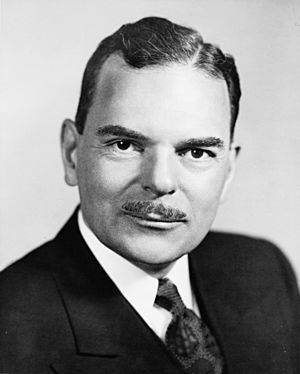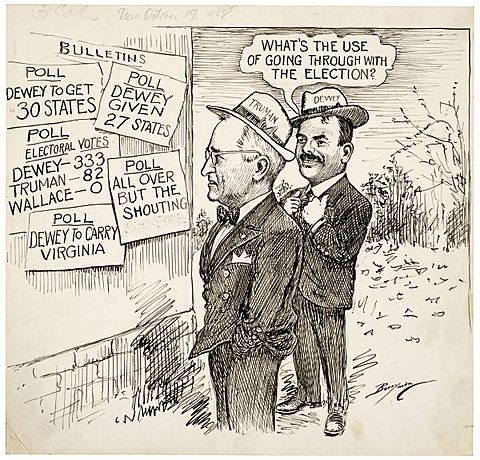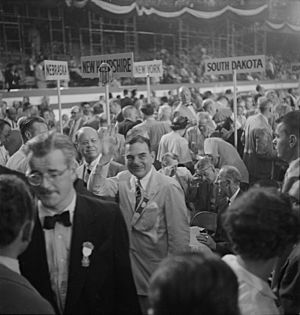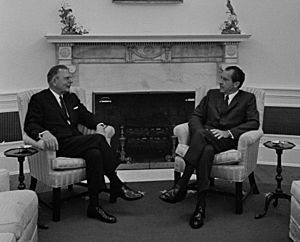Thomas E. Dewey facts for kids
Quick facts for kids
Thomas E. Dewey
|
|
|---|---|
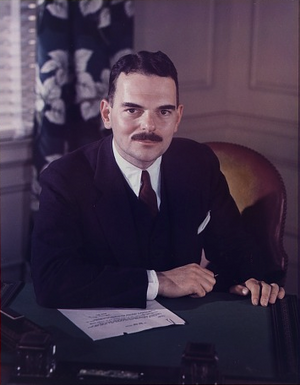
Dewey, c. 1938
|
|
| 47th Governor of New York | |
| In office January 1, 1943 – December 31, 1954 |
|
| Lieutenant | Thomas W. Wallace Joe R. Hanley Frank C. Moore Arthur H. Wicks (acting) Walter J. Mahoney (acting) |
| Preceded by | Charles Poletti |
| Succeeded by | W. Averell Harriman |
| 33rd District Attorney of New York County | |
| In office January 1, 1938 – December 31, 1941 |
|
| Governor | Herbert H. Lehman |
| Preceded by | William C. Dodge |
| Succeeded by | Frank Hogan |
| United States Attorney for the Southern District of New York | |
|
Acting
|
|
| In office November 22, 1933 – December 26, 1933 |
|
| President | Franklin D. Roosevelt |
| Preceded by | George Z. Medalie |
| Succeeded by | Martin Conboy |
| Personal details | |
| Born |
Thomas Edmund Dewey
March 24, 1902 Owosso, Michigan, U.S. |
| Died | March 16, 1971 (aged 68) Miami, Florida, U.S. |
| Political party | Republican |
| Spouse |
Frances Hutt
(m. 1928; died 1970) |
| Children | 2, including Thomas Jr. |
| Education | University of Michigan (BA) Columbia University (LLB) |
| Signature |  |
Thomas Edmund Dewey (March 24, 1902 – March 16, 1971) was an American lawyer and politician. He served as the 47th governor of New York from 1943 to 1954. He was also the Republican candidate for president in 1944 and 1948.
Dewey grew up in Owosso, Michigan. As a prosecutor in New York City, he worked hard to stop organized crime. He was famous for successfully prosecuting Lucky Luciano, a powerful crime boss, in 1936. Luciano was sent to prison for 30 to 50 years.
Dewey led the moderate group within the Republican Party. This group supported the United Nations and fighting against communism. They also supported many social programs from the New Deal.
After his time as governor, Dewey worked as a lawyer. He died in 1971 from a heart attack while on vacation in Miami, Florida.
Contents
Early Life and Family
Thomas Dewey was born and grew up in Owosso, Michigan. His father owned a local newspaper, and his mother taught him to respect common sense. From a young age, Dewey showed leadership. By age thirteen, he had nine other kids working for him selling newspapers. In high school, he was class president and editor of the yearbook.
Dewey was a talented singer with a deep voice. In 1923, he placed third in a national singing contest. He thought about becoming a professional singer. However, a temporary throat problem made him choose a career in law instead. He earned his college degree from the University of Michigan in 1923. He then got his law degree from Columbia Law School in 1925.
In 1928, Dewey married Frances Eileen Hutt. She was a singer and actress, but she stopped acting after they married. They had two sons, Thomas E. Dewey Jr. and John Martin Dewey.
From 1939 until his death, Dewey lived on a large farm called "Dapplemere" near Pawling (town), New York. He loved his farm and said it was his "roots." His neighbors included famous people like reporter Lowell Thomas. Dewey was a lifelong member of the Episcopal Church. He was also a dedicated Republican. He believed the Republican Party was the best way to have good government.
Fighting Crime
Dewey first worked as a federal prosecutor. He then had a successful private law practice. But he left it to become a special prosecutor in New York City. His job was to investigate corruption.
Federal and Special Prosecutor
In the early 1930s, Dewey became well-known for prosecuting Waxey Gordon, a famous bootlegger. Dewey was very thorough in his work. He used telephone taps, which were legal then, to gather evidence. His goal was to take down entire criminal organizations.
In 1935, Dewey became a special prosecutor in Manhattan. The local District Attorney was not doing enough to fight crime. So, the governor asked Dewey to step in. Dewey hired a large team of assistants and investigators. The New York City Mayor, Fiorello H. La Guardia, also gave him a special police squad. Dewey focused on large-scale criminal groups, especially those involved in extortion. People admired his honesty and his ability to get "results."
One of his main targets was gangster Dutch Schultz. Schultz was murdered in 1935. Crime bosses ordered his death because he planned to kill Dewey. They feared this would cause a huge police crackdown.
Dewey's team then focused on Lucky Luciano, a major crime boss. Dewey successfully convicted Luciano in 1936. Luciano was sentenced to 30 to 50 years in prison.
In 1937, Dewey also convicted Tootsie Herbert, who led New York's poultry racket. After this, food prices for consumers went down. Newspapers praised Dewey for breaking up the "shadow government" of criminals. He became a national hero, known as the "Gangbuster." His fight against crime even inspired a popular radio show called Gang Busters.
Manhattan District Attorney
In 1937, Dewey was elected New York County District Attorney for Manhattan. He was so popular that signs were put up in other areas saying, "Dewey Isn't Running in This County."
As District Attorney, Dewey convicted Richard Whitney, the former president of the New York Stock Exchange, for embezzlement. Whitney received a five-year prison sentence. Dewey also convicted Tammany Hall political boss James Joseph Hines for racketeering. This brought Dewey more national attention. A 1939 poll showed him as a leading candidate for president. In 1939, he also convicted Fritz Julius Kuhn, an American Nazi leader, for embezzlement. This weakened Kuhn's organization.
During his four years as District Attorney, Dewey and his team had a 94 percent conviction rate. They also created new departments to fight fraud and rackets. They investigated unsafe buildings, reducing their number greatly. When he left office in 1942, Dewey stated that "clean government can also be good politics."
Governor of New York
Thomas E. Dewey was known as an honest and effective governor. He increased state funding for education and raised salaries for state employees. He also reduced the state's debt. He called his approach "pay-as-you-go liberalism." This meant being progressive while also managing money wisely.
Elections as Governor
In 1938, Dewey ran for Governor of New York for the first time. He was only 36 years old. He lost, but his strong performance gained him national attention.
In 1942, Dewey ran again and won by a large margin. He was re-elected in 1946 with the biggest lead in state history at that time. In 1950, he was elected for a third term.
Key Policies and Achievements
As governor, Dewey signed the Ives-Quinn Act of 1945. This was the first state law in the country to stop racial discrimination in employment. He also created the State University of New York. Early in his term, he found that some state workers and teachers were paid very little. He gave them large raises, some as high as 150%.
Dewey strongly supported building the New York State Thruway. This major highway was later named in his honor. He also made many state agencies more efficient. During World War II, he saved money, creating a large budget surplus. This money was used for mental health facilities, public housing, tree planting, and a water pollution program. It also helped create a "model veterans' program."
Dewey also focused on helping businesses. He created a state Department of Commerce to attract new businesses and tourists. Between 1945 and 1948, 135,000 new businesses started in New York.
Dewey supported the death penalty. During his twelve years as governor, more than ninety people were executed in New York. This included members of the crime group Murder, Inc..
Presidential Campaigns
Thomas Dewey ran for president twice, in 1944 and 1948.
1940 Presidential Bid
Dewey first sought the Republican presidential nomination in 1940. He was an early favorite. However, his support dropped as World War II intensified in Europe. Many Republican leaders felt he was too young and inexperienced to lead during wartime. Also, Dewey's view of staying out of the war became a problem. At the Republican Convention, delegates chose Wendell Willkie instead. Willkie lost to President Franklin D. Roosevelt.
1944 Presidential Campaign
By 1944, Dewey's views on foreign policy had changed. He became an internationalist and supported organizations like the United Nations. He was the leading candidate for the 1944 Republican nomination. He won key primary elections. At the Republican Convention, he was nominated almost without opposition. He chose Ohio governor John W. Bricker as his running mate. Dewey was the first presidential candidate born in the 20th century.
During the election, Dewey criticized President Roosevelt's programs. He avoided military and foreign policy debates. He considered revealing a secret about the attack on Pearl Harbor. However, George C. Marshall, the Army Chief of Staff, asked him not to. Marshall explained that this secret information could help the enemy. Dewey agreed not to use it.
Roosevelt also shared war information with Dewey during the campaign. This was the first time an opposing presidential candidate received such briefings. Dewey lost the election to President Roosevelt. He received 45.9% of the popular vote.
1948 Presidential Campaign
Dewey was the Republican candidate again in the 1948 United States presidential election. His running mate was California Governor Earl Warren. Most people expected Dewey to win easily against President Harry S. Truman. Truman had become president after Roosevelt died in 1945.
During the campaign, Dewey was advised to avoid making mistakes. He spoke carefully and did not give many specific plans. He often used general, optimistic statements. One famous quote was: "You know that your future is still ahead of you."
Dewey's cautious approach came from his 1944 experience. He felt that in 1944, he had argued too much with Roosevelt. He believed this had cost him votes. So, in 1948, he tried to appear non-partisan and positive. He ignored Truman's criticisms. This strategy did not work well. Truman often criticized Dewey, who never responded directly.
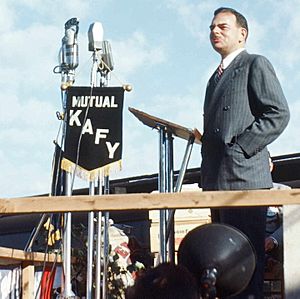
Near the end of the campaign, Dewey thought about changing his style. He wanted to be more aggressive. But his advisors, including his wife, convinced him to stick to his plan.
The Chicago Daily Tribune famously printed "Dewey Defeats Truman" as its headline before all the votes were counted. However, Truman won the election in one of the biggest upsets in history. Dewey received 45.1% of the popular vote. Truman won key states like Illinois, California, and Ohio by very small margins. If Dewey had won these states, he might have won the election.
After the election, Dewey said they lost because they did not get enough farm votes.
1952 Presidential Election
Dewey did not run for president in 1952. However, he played a big role in helping Dwight D. Eisenhower win the Republican nomination. Eisenhower went on to win the presidency.
Dewey also helped Richard Nixon become Eisenhower's running mate. Many of Dewey's close advisors later became important figures in Eisenhower's government.
Later Career and Legacy
After his third term as governor ended in 1954, Dewey retired from public service. He returned to his law firm, Dewey Ballantine. He remained an influential figure in the Republican Party. In 1956, he helped convince Eisenhower to keep Nixon as his running mate. Dewey also supported Nixon's presidential campaign in 1960.
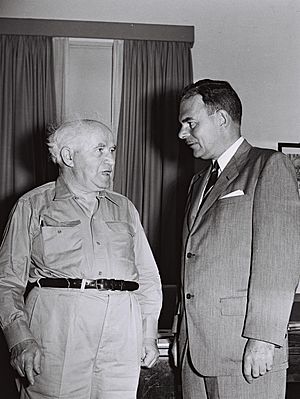
As the Republican Party became more conservative, Dewey became less involved in party matters. He did not attend the 1964 Republican Convention. Still, he publicly supported the Republican candidate, Barry Goldwater.
Dewey was a close friend of Democratic Senator Hubert H. Humphrey. He even helped Humphrey become the Democratic nominee for vice-president in 1964.
Presidents Lyndon Johnson and Richard Nixon offered Dewey positions in government. But Dewey declined all offers. He preferred to focus on his successful law firm. By the early 1960s, he was a millionaire.
In 1964, the New York State legislature officially renamed the New York State Thruway in Dewey's honor. It is now called the Governor Thomas E. Dewey Thruway.
Dewey's official papers from his political career are kept at the University of Rochester library. In 2005, the New York City Bar Association created the Thomas E. Dewey Medal. This award is given annually to outstanding Assistant District Attorneys in New York City.
Public Image
People had different opinions about Thomas Dewey. Some praised his good intentions, honesty, and leadership skills. Others criticized him for being too ambitious or stiff in public. One writer said he had "a personality that attracted contempt and adulation in equal proportion."
Dewey was a powerful speaker. He drew large crowds during his campaigns. His friend Lowell Thomas called him "an authentic colossus." Pollster George Gallup described Dewey as "the ablest public figure of his lifetime."
However, President Franklin D. Roosevelt privately called Dewey "the little man." Some conservative Republicans saw him as too connected to New York's powerful groups.
Herbert Brownell, Dewey's campaign manager, said Dewey was "a tough man to herd." He would tell local leaders directly if they were not doing a good job. Brownell also noted that Dewey did not enjoy shaking hands or small talk. He was a hard worker and a "real fighter." But he was not "geared to our political system" in terms of being outgoing.
Appearance and Campaigns
Dewey grew his mustache because his wife liked it. It became a recognizable feature. During the 1944 election, Alice Roosevelt Longworth famously called him "the little man on the wedding cake." This nickname stuck with him.
Dewey's presidential campaigns were sometimes hurt by his habit of not being too specific on difficult issues. President Truman joked that the Republican Party's initials, G.O.P., stood for "grand old platitudes."
Dewey was the first presidential candidate to use his own team of pollsters. He strongly believed in public opinion polls. In 1948, when he was leading in the polls, he told a worried businessman, "when you're leading, don't talk."
Some people, like journalist Walter Lippman, saw Dewey as someone who changed his views to be popular. Journalist John Gunther wrote that Dewey "seldom goes out on a limb by taking a personal position which may be unpopular."
Honesty and Integrity
Dewey was known for his honesty and integrity. Newspaper editor William Allen White called him "an honest cop with the mind of an honest cop." An editorial in 1953 said that Dewey was "ruthless in his actions, but we also think he will countenance nothing that smacks of trickery and dishonesty."
He insisted that every job candidate earning over $2,500 be thoroughly checked by state police. He believed that public officials should be able to earn more money in private life. This showed his concern about corruption. He never accepted anonymous campaign donations. He also dated his autographs so no one could pretend to have a closer relationship with him than they did.
Death
Dewey's wife, Frances, died in July 1970 after battling breast cancer. Later that year, he began dating actress Kitty Carlisle.
On March 15, 1971, Dewey traveled to Miami, Florida, for a golfing vacation. The next day, he was found dead in his hotel room. An autopsy showed he died suddenly from a massive heart attack.
A public memorial service was held in New York City. Many important politicians attended, including President Nixon. Dewey was buried next to his wife in Pawling (town), New York. His farm, Dapplemere, was later sold and renamed "Dewey Lane Farm" in his honor.
See also
 In Spanish: Thomas E. Dewey para niños
In Spanish: Thomas E. Dewey para niños
 | Anna J. Cooper |
 | Mary McLeod Bethune |
 | Lillie Mae Bradford |


